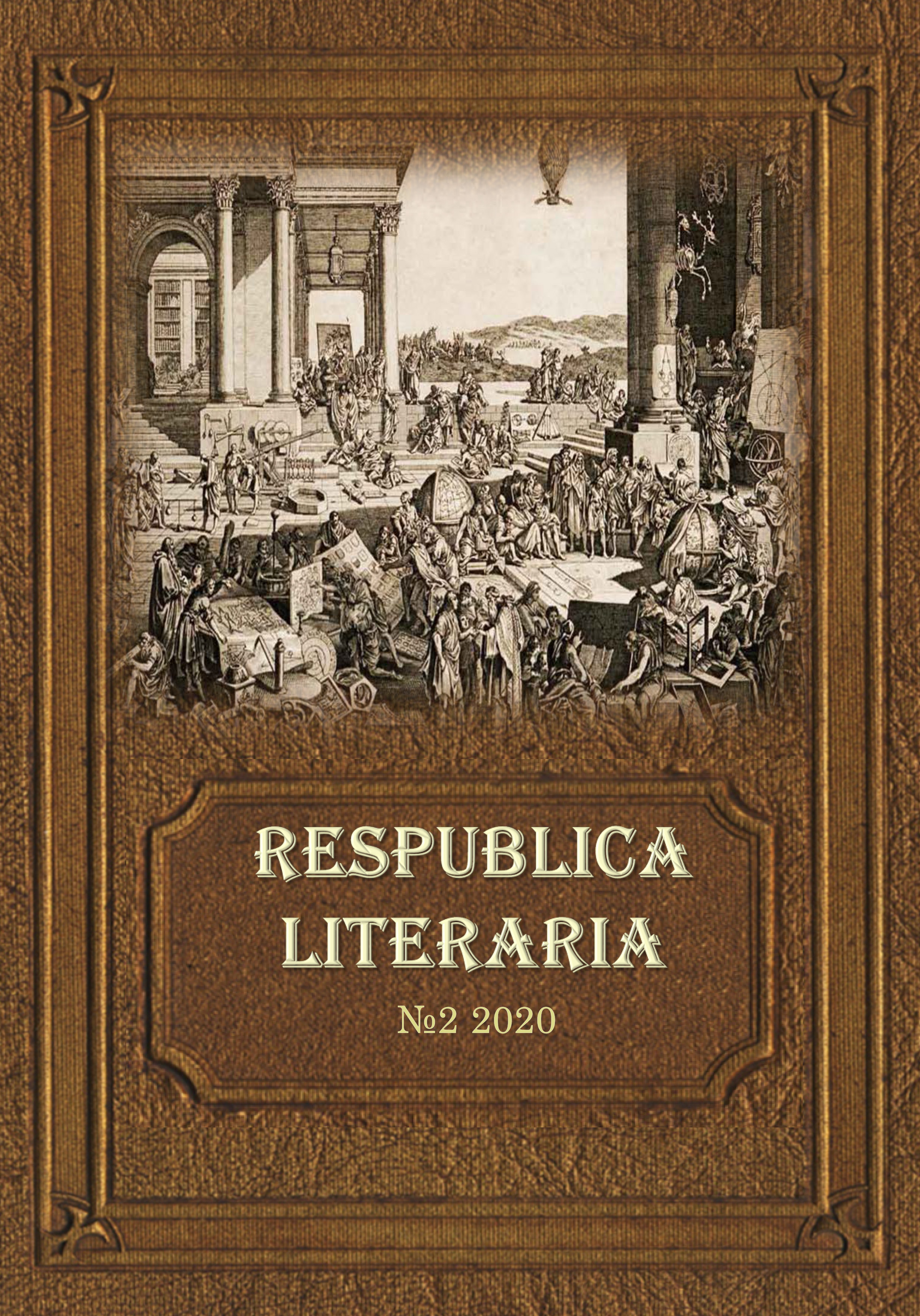A FEATURE OF THE CONCEPTION INHERITANCE IN THE ELEATIC SCHOOL OF PHILOSOPHY
DOI:
https://doi.org/10.47850/RL.2020.1.2.28-51Keywords:
Parmenides, Zeno of Elea, the Eleatic School, Zeno’s aporias, unity of being, One–Many Problem, the power of the continuum, continuity of line, mental holism.Abstract
The purpose of the paper is to identify common theses supposedly shared by Parmenides and Zeno of Elea. In order to achieve this goal, we show that an alternative interpretation of the aporia from 29 B 1 DK is possible, in which we don’t deal with an infinite division of an extended being, but we deal with a regression of relations of an arbitrary type. These relations are connecting an arbitrary type of constituents of a complex object. In this case, the aporia proves the impossibility of a complex object of any type, not just the impossibility of an extended object. Finally, we show that interpreted in this way Zeno’s reasoning from 29 B 1 DK, and appropriately interpreted Parmenides’ proofs of the unity of being in 28 B 8 DK can be treated as based on a holistic assumption. This enables us to assert that Zeno was the successor of Parmenides, not only in the sense that he was indirectly proving Parmenides’ thesis of the unity of being, but also in the sense that he was using a statement that Parmenides could imply.
References
Берестов, И. В. (2011). Принцип «неразличимости тождественных» в парменидовском обосновании немыслимости множественности и различий в сущем. Вестник Новосибирского государственного университета. Серия: Философия. Т. 9. Вып. 3. С. 135-144.
Berestov, I.V. (2011). Principle of the Indiscernibility of Identicals in Parmenides’ Arguments for Unintelligibility of any Plurality and Differences in the What-Is. Vestnik Novosibirsk State University. Series: Philosophy. Vol. 9. no. 3. pp. 135-144. (In Russ.)
Берестов, И. В. (2015a). Основания действенности регресса в «аргументе третьего человека» в «Пармениде» Платона. ΑΡΧΗΓΟΣ. Лекции и исследования по истории античной философии. Василию Павловичу Горану по случаю 75-летия от коллег и учеников. Учебное пособие. Ред.: Е. В. Афонасин, М. Н. Вольф. Новосибирск. РИЦ НГУ. С. 35-68.
Berestov, I.V. (2015a). Reasons of Third Man Argument Efficiency in Plato’s Parmenides. In Afonasin, E. V., and Volf, M. N. (eds.) ΑΡΧΗΓΟΣ. Lectures and Studies in Ancient Philosophy (Teaching aids). Novosibirsk. Novosibirsk State University Publ. pp. 35-68. (In Russ.)
Берестов, И. В. (2015b). «Единство сущего» у Парменида как неразличимость конституент ноэмы. Вестник Томского государственного университета. Философия. Социология. Политология. № 4 (32). С. 240-253. DOI: 10.17223/1998863X/32/27.
Berestov, I.V. (2015b). “Unity of Being” in Parmenides as Indistinguishability of Noema’s Constituents. Tomsk State University Journal of Philosophy, Sociology and Political Science. no. 4 (32). pp. 240-253. DOI: 10.17223/1998863X/32/27. (In Russ.)
Берестов, И. В. (2015c). Сущее как интенциональный объект мышления и «единство сущего» у Парменида. Вестник Российского университета дружбы народов. Серия: Философия. № 4. С. 23-36.
Berestov, I. V. (2015c). Being as Intentional Object of Thinking and “Unity of Being” in Parmenides. RUDN Journal of Philosophy. no. 4. pp. 23-36. (In Russ.)
Берестов, И. В. (2017). Бесконечный регресс в Met. Z, 17 и проблематичность единства составного объекта. Аристотелевское наследие как конституирующий элемент европейской рациональности. Материалы Московской международной конференции по Аристотелю. Институт философии РАН, 17-19 октября 2016 г. Ред. В. В. Петров. М. Аквилон. С. 121-137.
Berestov, I.V. (2017). The Infinite Regress in Met. Z, 17 and the Difficulty with The Unity of a Composite Object. In Petrov, V.V. (ed.) The Legacies of Aristotle as Constitutive Element of European Rationality. Moscow. Aquillo Press. pp. 121-137. (In Russ.)
Abraham, W. E. (1972). The Nature of Zeno’s Argument Against Plurality in 29 B 1 DK. Phronesis. Vol. 17. pp. 40-52.
Adamson, I. T. (1998). A Set Theory Workbook. Birkhäuser Boston. Cambridge (Mass., USA). viii. 154 pp.
Barnes, J. (1982). The Presocratic Philosophers. London and New York. Routledge. xvii. 601 p. (First published in two volumes in 1979 by Routledge & Kegan Paul).
Benacerraf, P. (2001). Tasks, Supertasks, and the Modern Eleatics. In Salmon, W. C. (ed.) Zeno’s Paradoxes. Indianapolis. Hacklett. pp. 103-129. (Originally published in 1962).
Booth, N. B. (1957). Were Zeno’s Arguments a Reply to Attacks upon Parmenides? Phronesis. Vol. 1. pp. 1-9.
Burnet, J. (ed.) (1901-1902). Platonis opera. Vol. I-IV. Oxford. Clarendon Press.
Carroll, L. (1895). What the Tortoise Said to Achilles. Mind. Vol. 4. no. 14. pp. 278-280.
Cave, P. (2007). With and Without End. Philosophical Investigations. Vol. 30. no 2. pp. 105-126.
Curd, P. (2004). The Legacy of Parmenides: Eleatic Monism and Later. Presocratic Thought. Las Vegas. Parmenides Publishing. xxxix. 280 pp. (Originally published in 1998 by Princeton University Press).
Diels H., Kranz W. (eds.) (1951-1952). Die Fragmente der Vorsokratiker (=DK). Griechisch und Deutsch H. Diels. Herausgegeben von W. Kranz. Bd I–II. Die sechste Auflage. Hildesheim. Weidmannsche Verlagsbuchhandlung.
Diels., H. (ed.) (1882). Simplicii in Aristotelis physicorum libros octo commentaria, libri 1–4. In 2 vols. Vol. 1. Berlin. Reimer. 372 pp. (Commentaria in Aristotelem Graeca. Vol. 9).
Ehrlich, P. (2014). An Essay in Honor of Adolf Grünbaum’s Ninetieth Birthday: A Reexamination of Zeno’s Paradox of Extension. Philosophy of Science. no 81(4). pp. 654-675.
Grünbaum, A. (2001). Zeno’s Metrical Paradox of Extension. In Salmon W. C. (ed.) Zeno’s Paradoxes. Indianapolis. Hacklett. pp. 164-199 (Originally published in 1967).
Harrison, С. (1996). The Three Arrows of Zeno: Cantorian and Non-Cantorian Concepts of the Continuum and of Motion. Synthese. Vol. 107. pp. 271-292.
Harte, V. (2002). Plato on Parts and Wholes: The Metaphysics of Structure. Oxford, New York. Clarendon Press. vii. 311 p.
Hilbert, D., Bernays, P. (1934). Grundlagen der Mathematik. Bd. 1. Berlin. Springer. XII. 471 S.
Ketchum, R. (1993). A Note on Barnes’ Parmenides. Phronesis. Vol. 38. no. 1. pp. 95-97.
Kirk, G. S., Raven, J. E. (1960). The Presocratic Philosophers. Cambridge. Cambridge University Press. XII. 487 pp. (First edition in 1957).
Laks, A., Most, G. W. (eds.) (2016). Early Greek Philosophy. Vol. V: Western Greek Thinkers. Part 2. Edited and translated by André Laks and Glenn W. Most in collaboration with Gérard Journeé and assisted by Leopoldo Iribarren. Cambridge (Mass., USA), London (UK). Harvard University Press. 801 pp. (Loeb Classical Library. Vol. 528).
Lee, H. P. D. (1936). Zeno of Elea (= Lee). Cambridge. CUP. vi. 125 p.
Lewis, A. F. (2009). Parmenides’ Modal Fallacy. Phronesis. Vol. 54. pp. 1-8.
Loux, M. J. (1978). Substance and Attribute: A Study in Ontology. Dortrecht (Holland). D. Reidel Publishing Company. xi. 187 p.
Makin, S. (1982). Zeno on Plurality. Phronesis. Vol. 27. pp. 223-238.
McLaughlin, W. I. (1994). Resolving Zeno’s Paradoxes. Scientific American. Vol. 271. no. 5. pp. 66-71.
McLaughlin, W. I., Miller, S. L. (1992). An Epistemological Use of Nonstandard Analysis to Answer Zeno’s Objections Against Motion. Synthese. Vol. 92. pp. 371-384.
Mourelatos, A. P. D. (2008). The Route of Parmenides: Revised and Expanded Edition; With a New Introduction, Three Supplemental Essays, and an Essay by Gregory Vlastos. Las Vegas, Zürich, Athens. Parmenides Publishing. L. 408 pp. (Originally published in 1970 by Yale University Press).
Mueller, I. (1969). Zeno’s Paradoxes and Continuity. Mind (New Series). Vol. 78. no. 309. pp. 129-131.
Owen, G. E. L. (1986). Eleatic Questions. In Nussbaum, M. (ed.) In: Logic, Science, and Dialectic: Collected Papers in Greek Philosophy. Ithaca. Cornell University Press. pp. 3-26. (Originally published in 1960).
Papa-Grimaldi, A. (1996). Why Mathematical Solutions of Zeno’s Paradoxes Miss the Point: Zeno’s One and Many Relation and Parmenides’ Prohibition. Review of Metaphysics. Vol. 50. no. 2. pp. 299-314.
Peterson, S. (1978). Zeno’s Second Argument against Plurality. Journal of the History of Philosophy. Vol. 16. pp. 261-270.
Ross, W. D. (ed.) (1924). Aristotle’s Metaphysics. In 2 vols. Oxford. Clarendon Press.
Sisko, J. E., Weiss Y. (2015). A Fourth Alternative in Interpreting Parmenides. Phronesis. Vol. 60. no. 1. pp. 40-59. DOI: 10.1163/15685284-12341278.
Solmsen, F. (1971). The Tradition about Zeno of Elea re-examined. Phronesis. Vol. 16. pp. 116-41.
Thomson, J. (2001a). Tasks and Super-Tasks. In Salmon, W. C. (ed.) In: Zeno’s Paradoxes. Indianapolis. Hacklett. pp. 89-102 (Originally published in 1954).
Thomson, J. (2001b). Comment on Professor Benacerraf’s Paper. In Salmon, W. C. (ed.) Zeno’s Paradoxes. Indianapolis. Hacklett. pp. 130-138 (Originally published in 1970).
Vlastos, G. (1975). Plato’s testimony concerning Zeno of Elea. Journal of Hellenic Studies. Vol. 95. pp. 136-62.
Wedin, M. V. (2014). Parmenides’ Grand Deduction: A Logical Reconstruction of the Way of Truth. Oxford (UK). Oxford University Press. x. 275 pp.
Downloads
Published
How to Cite
Issue
Section
License

This work is licensed under a Creative Commons Attribution-NonCommercial-NoDerivatives 4.0 International License.
https://oc.philosophy.nsc.ru/remote.php/webdav/%D0%94%D0%BE%D0%B3%D0%BE%D0%B2%D0%BE%D1%80%20%D1%81%20%D0%B0%D0%B2%D1%82%D0%BE%D1%80%D0%BE%D0%BC%20RL-%D0%BF%D1%80%D0%B0%D0%B2.doc










